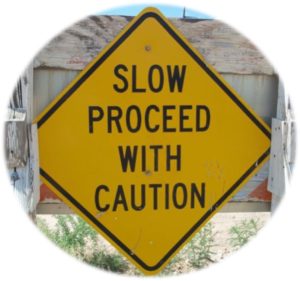One of the most common causes of failures in communication is allowing our mouths to take action prior to our brain having its say. This happens most often in highly emotional interactions but can happen in any conversation if we are too casual in speaking.
That old saying of “look before you leap” has its parallel, “think before you speak” in conversations.

The all-too-common scenario in emotionally-charged conversations goes like this: We are approached by someone with a complaint or criticism, who makes an angry or derisive statement. The limbic system of our brain, the portion responsible for reflexes, wants to charge ahead in protective mode, by making a reaction in a similar or greater level of anger. The reaction is likely to simply be a verbal counterattack on the other person. A reflexive reaction is not likely to be a thoughtful response to the issue presented but, rather, a personal attack or a defensive counter argument.
Even without the high emotions, our conversations can cause damage. Think of some possible scenarios of commenting without giving it much thought:
- As someone finishes a crash project requiring several hours of hard work, we mention that there would have been a much simpler and better solution.
- Someone seems distracted in a meeting, so we point out that we need everyone’s attention, without remembering that the person is facing a crisis in an extended family situation.
- During a conversation with several participants contributing thoughts, we, as the leader, suddenly blurt out, “Here’s what we’ll do.”
“We are masters of the unsaid words, but slaves of those we let slip out.” – Winston Churchill
It is important to think before we speak because our words can have various effects. We want to manage our words for maximum positive effect. Here are just of the few ways that words can affect others and our relationship with them:
- Words can energize or demotivate.
- Words can draw people in or push them away.
- Words can open up thoughts or shut them down.
- Words can heal or harm.
- Words can invite gentleness or harshness.
- Words can build or tear down.
- Words can inspire, encourage, comfort, edify, soothe, teach, instruct, guide, admonish, explain, provide insight, pass on wisdom, etc. Words can also tear down, destroy, diminish, minimize, criticize, demean, abuse, intimidate, accuse, blame, defame, etc.
Think before you speak. There are three questions that are useful in guiding our thought process and shaping the words that we speak.
Is it true? While most of us do not intentionally tell lies, we can often catch ourselves saying things that are not fully factual. Asking this question should weed out rumors, gossip, exaggeration of facts to satisfy our ego, opinions about people, etc. It also forces the question about authenticity in our communication, are we speaking from who we truly are?
Is it necessary? Asking this question, forces us to examine the value added through the words we are about to speak. This screens out complaining, whining, negative comments, and insults. (See articles on effective feedback for tips on providing suggestions or expectations regarding needed improvement.) The comment under consideration may also be necessary but not for the given time, place, or audience.
Is it kind? Do the words that you are about to say convey respect, compassion, empathy, and graciousness to the audience? Even in communicating reproof or correction, the phrasing and tone that we use can convey compassion. This question should stop us short of making comments intended to hurt or belittle, even in a highly emotional discussion.
Only when we have thought through these questions should we speak or respond. With continual practice, these questions can become a pattern of communication. With such a pattern, we can reinforce rather than damage a relationship of trust and respect that is vital to effective leadership.
Do you make it a habit to speak wisely and graciously to those around you? Are your words based on thought to produce positive effect?
Here are some previous articles on similar topics:
- “React or Respond” speaks about the difference between a quick emotional reaction and a thoughtful, gracious response.
- “Press the Pause Button” speaks about hearing, understanding, and responding in discussions.
- “Leaders Speak Last” is a caution about allowing the powerful voice of a leader to drown out the voices of the team members.

Add your comment